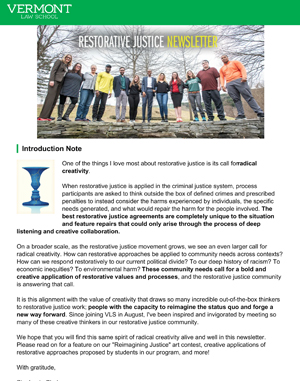Moving from fossil fuels to electric technologies on farms can reduce greenhouse gas emissions, benefit the electric grid, and cut energy costs for consumers and utilities, according to a new report.
The report, Energizing Agriculture: Policy Opportunities for Beneficial Electrification on the Farm, was released today by Vermont Law and Graduate School’s (VLGS) Farm and Energy Initiative, a collaboration between the VLGS Center for Agriculture and Food Systems and the VLGS Institute for Energy and the Environment.
Farms use fossil fuels for a range of technologies that can be adapted to electric power. These include irrigation, space heating and cooling, refrigeration, grain drying, water heating, vehicles and even maple sap evaporation.
Programs encouraging the shift from fossil fuels to more efficient electric equipment are usually designed for residential and commercial customers. As a result, farmers often miss out on the chance to benefit from cost-saving initiatives or find that existing programs are not compatible with the special needs of agricultural production.
“Everyone benefits when farmers have access to policies and programs that help them transition to cleaner technologies,” said Genevieve Byrne, one of the authors of the report, professor of law at VLGS, and staff attorney for the Farm and Energy Initiative.
Achieving the benefits of agricultural electrification will require overcoming a range of challenges, including the need for improvements in rural grid infrastructure, digital connectivity and increased cooperation between utilities and farmers.
Thought leaders, policymakers, utility companies and farmers have roles to play. Education and collaboration between stakeholders and policymakers are necessary to ensure farms are not excluded from beneficial electrification efforts and can contribute to the clean energy transition.
“Achieving a decarbonized agricultural sector will be a complex undertaking that requires a concerted effort from stakeholders,” said Byrne. “Improved policy can guide the way and open up opportunities for beneficial electric technologies on farms.”
###
The Farm and Energy Initiative (FEI) is a collaboration between the Institute for Energy and the Environment and the Center for Agriculture and Food Systems at Vermont Law and Graduate School. FEI seeks to lead research and create open-access resources for farmers, researchers, and public citizens alike, to promote the future sustainability of the agricultural industry. Our projects examine legal and practical issues at the intersection of energy and agriculture with the goal of improving agricultural energy management nationwide. Learn more about our work at farmandenergyinitiative.org.
Vermont Law and Graduate School, a private, independent institution, is home to a law school that offers ABA-accredited residential and online hybrid JD programs and a graduate school that offers master’s degrees and certificates in multiple disciplines, including programs offered by the Maverick Lloyd School for the Environment, the Center for Justice Reform and other graduate-level programs emphasizing the intersection of environmental justice, social justice and public policy. Both the law and graduate schools strongly feature experiential clinical and fieldwork learning. For more information, visit vermontlaw.edu.


















